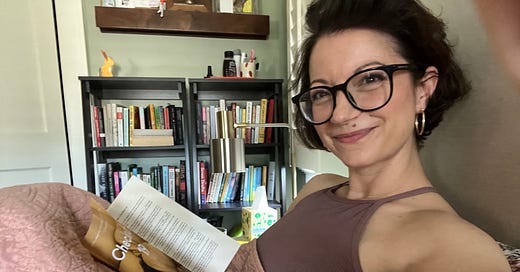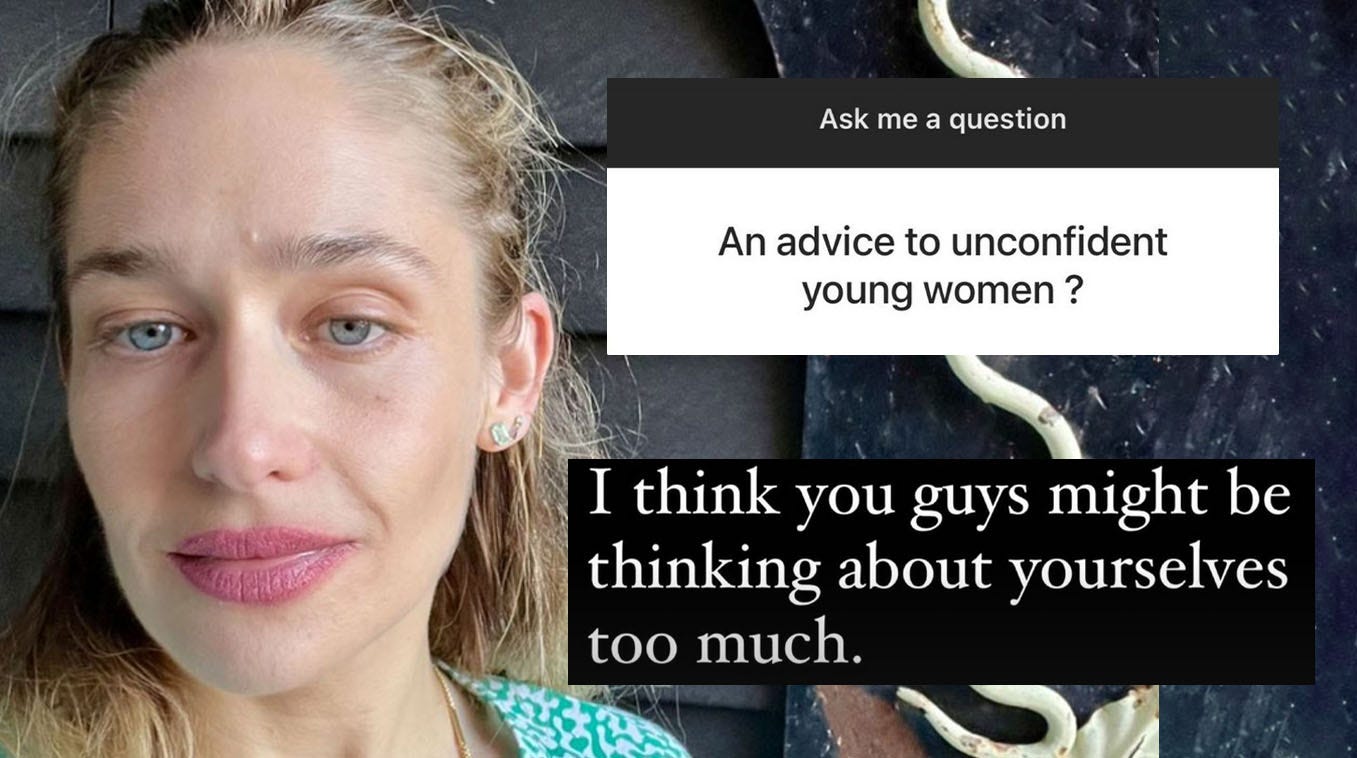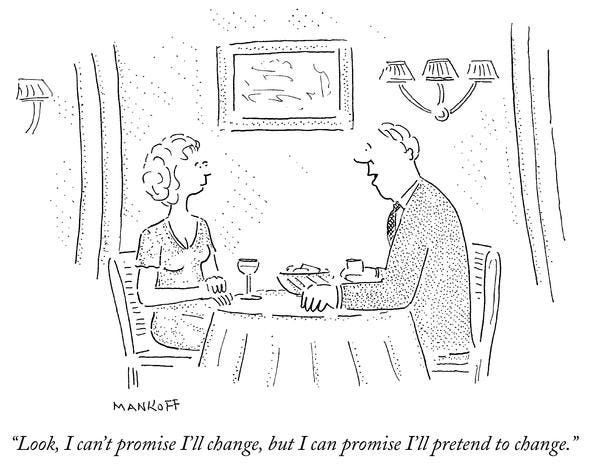Issue 126: The anxiety of being a Reader
On the exhausting vigilance of maintaining a reading identity
I was reading in bed this past weekend—Checkout 19 by Claire-Louise Bennett. Reading in bed is my favorite place to read and I was just feeling so happy and good. Claire-Louise Bennett is such an odd duck, her style is deeply confusing but—to me—profoundly gratifying and worth the effort. This book in particular has been so enjoyable to read – the coming of age story of a reader—that at many points I literally put it down and thought—I don’t want it to ever end. 🥹🥹
And yet. I had been reading it for two weeks at that point and was starting to feel antsy about that. Why was it taking so long?! Why hadn’t I finished more books in the meantime? And, why did I care in the first place? Why was I worried that I’d been reading it for two weeks when reading it slowly was actually giving me more time with it. Time that I was enjoying immensely?! The thing I had literally prayed for?!
I’ve built much of my creative life around being a reader—not just someone who reads, but a Reader, capital R. My newsletter, my journaling practice, my sense of how I process the world—all of it is scaffolded around books.
I struggled for years to allow myself to do this—I felt undeserving of it, I wasn’t a “professional” so the idea of simply claiming this identity for myself felt laughable until I turned 42, stepped through the portal and basically said—fuck it, I can do what I want. So, I dove right in (and many of you have followed that journey)... and the joy and freedom that I felt immediately were so profound that I shudder at the thought how easily I could have continued as I was. Reading like a maniac has been a huge part of this process so when I can’t read—for whatever reason—it is not a casual disruption. It honestly feels existential to me. If I’m not reading, I basically feel like I am abandoning myself.
Conventional wisdom—like the ideas articulated in James Clear’s Atomic Habits—advises this is exactly what we’re supposed to do. Every action you take is a vote for the type of person you wish to become, insists Clear. You want to be a reader? Identify as one. Build habits around that identity. Even when you are not reading, Clear would recommend you talk to other people who identify as readers, visit bookstores, think about what you want to read, etc. Hmm. Check, check, and check. I wasn’t doing this intentionally but in many ways this has been my path over the last few years, especially after I started writing this newsletter. I have turned reading into a mirror. Every book I do or do not read feels in many ways as a reflection of my selfhood. Reading does not feel like a straightforward encounter with a text. It has become a referendum on who I am.
I find this kind of self-shaping quite empowering actually. How cool is it that we can resolve to be the person we always wanted to be and simply go for it?! But my sudden anxiety over how much I am reading is making me aware, yet again, how self-mastery can quickly become self-surveillance. And, as I’ve previously written, I know that when that identity becomes too tightly bound, it can pretty quickly collapse under the weight of its own expectations. Been there, done that.
In Attention Seeking, Phillips argues that attention is inherently social and experimental. We seek attention—in his definition, attention is something we choose to attend to—as a way of discovering what matters to us.
In a healthy expression of that behavior, we focus on things that we find interesting and pleasurable. But of course, when we start trying to control that process—we can go too far. We stop following our curiosity and start managing our image. The desire to be seen becomes a need to be seen in a specific way. I find myself staring at my books and feeling both inspired and persecuted by them. My love and passion for reading is growing in intensity but so is my reader ego. I am reading but I am also finding myself hyper-fixating on what it means to be a reader, suffering the exhausting vigilance of maintaining an identity.
Do you guys remember the AMA session that Jemima Kirke did a little while on Instagram, where she was asked what advice she had for unconfident young women. Her answer—I think you guys might be thinking about yourselves too much.
I remember thinking at the time that her answer sounded flippant but I am now able to recognize how profound that advice actually is. Psychoanalysis, according to Phillips, is not about getting anybody ‘back on track.’ “Its aim is ‘to restore the loose ends’ of our narratives, to remind us that there may not be a fixed track at all.” Hyper-fixating on an interest or an identity narrows your attention to the detriment of everything else in your life. And when you find yourself so fixated – as I am on reading consistently, on reading well and on reading A LOT – your job is not to figure out how to do the thing you fixate on better but how to free yourself from the idea that doing the thing somehow makes you a better, more enlightened person. Instead, Phillips argues, you get curious and try to figure out why you thought that point of fixation became so important to you in the first place.
This is why I am writing this – to untangle from the anxiety of wanting to be reading MORE and reading BETTER. I know I am not the only one wrestling with finding a balance between wanting to push myself as a reader, which involves engaging with a lot of those identity fortifying experiences that so many people now refer to as “performative reading”—the lists, the journals, the bookshelfies, the “good books” the… erhum… substacks, and simply reading. The urge to maintain some sort of readerly purity is super strong in me—how to enjoy what I enjoy reading/doing and not feel defensive about who I am and what this whole endeavor means or why my book reviews may be doing the wrong thing that is not the thing that a proper critic is supposed to do, etc.
Instead, with Adam Phillips, I am trying to maintain curiosity about what made me want to be a reader so bad in the first place. I am letting the loose ends stay loose. I’m letting this post be my way of unfocusing—of talking myself out of the trance of perfectionism and self-surveillance. I’m trying to unbind my love of reading from the need to always be good at it. But… this feels hard. I don't actually know how to stop surveilling myself. Even writing this feels like I'm trying to be good at having problems.
From Checkout 19:
We were students of literature but we didn’t read in order to become clever and pass our exams with the highest commendations—we read in order to come to life. We were supremely adept at detecting metaphors, signs, analogies, portents—in books, and in our immediate realities. We confused life with literature and made the mistake of believing that everything going on around us was telling us something about our own little existences, our own underdeveloped hearts, and, most crucially of all, about what was to come. What was to come? What was to come?
P.S. I finished it. Reading this book made me feel messy, anxious, and probably too much. But the overwhelming feeling was still love.
🤓 Now tell me:
Do you recognize this feeling? That moment when you're enjoying a book but suddenly start calculating how long it's taking you to read it? When does reading stop feeling like pleasure and start feeling like performance for you?
What triggers your reading anxiety? Is it seeing other people's reading lists? Goodreads notifications? That stack of unread books staring at you? Something else entirely?
How do you know when you've crossed the line from "I love reading" to "I'm surveilling my reading"? What are your personal warning signs?













I sometimes feel that sort of performative/competitive itch with reading. Years ago when I was in my late 20s I packed James Joyce’s ‘Ulysses’ for a long flight because I felt like it was a serious piece of literature I should read. I struggled through about 50 pages before I resorted to flipping through the airline magazine and staring into space. And I never went back to it. Probably some literary god will smite me for that, ha.
But, now that I’m older I’m more comfortable with letting my own tastes guide my reading. Though nowadays I find myself going back and forth about how much to underline and make notes versus just totally immersing in reading.
I read so many books in college as an English major and learned to feel such pressure to read the right books in public and be able to say the right things about them. I carried this feeling for a couple of decades and at some point realized that I like to read things that make me laugh or make me feel lighter or take me completely away from myself, from overanalyzing my life and my own world (from thinking about myself too much!). In my mid-life I am feeling able to read when and how and what I like without explaining it (to myself or others). I love how you describe how reading is for you -something that is vital to your understanding of yourself and the world around you. This is how I feel about writing. And I love this line, "Even writing this feels like I'm trying to be good at having problems." That made me laugh out loud. Thank you for this!